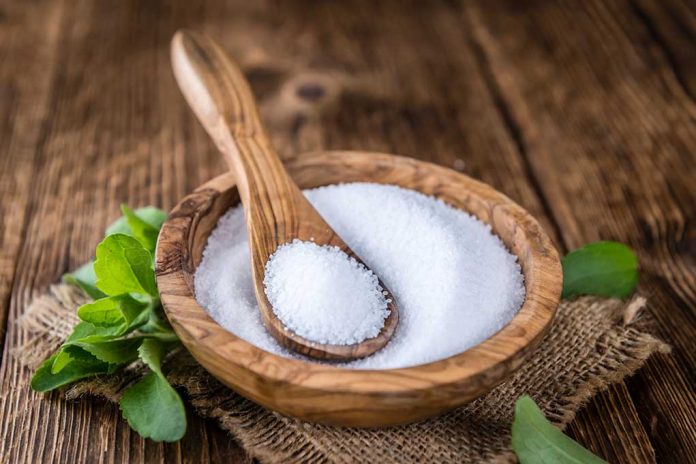
STOP! Is That “Substitute” Really Safe?
(AscendHealthy.com) – We’ve all heard that too much sugar is bad for us, and we might try switching to sweeteners like stevia to reduce our sugar intake. But could we be risking our overall health when we use stevia as a sugar substitute? We have more about stevia and how it might affect our health.
How is Stevia Made?
Stevia hit the market in 2008 and has been rising in popularity ever since. Other sugar substitutes are declining in popularity, mostly because of perceived health risks and concerns. But stevia doesn’t seem to have these ties. Most people are more comfortable with it, as opposed to options like saccharin and sucralose.
It’s made from the Stevia rebaudiana plant, making it more natural than some artificial sweeteners. This plant is a member of the chrysanthemum family. Truvia, PureVia, and SweetLeaf are common sweetener brands that contain stevia. But what people buy in the store is still very different from what they may grow at home.
What Common Products Use Stevia?
Desserts, gum, candy, drinks, yogurt, baked goods, and other items all use stevia. Consumers can purchase it in packets for use in coffee and other beverages, as well as for home-based baking. There’s really no limit to the products that can use stevia, but there are plenty of products that do not use it — at least, not yet.
Can Stevia Cause Health Problems?
The biggest question many people have with stevia is whether it’s truly a safe sugar substitute or whether it may cause health problems. Several artificial sweeteners have been generally recognized as safe (GRAS), despite ongoing insistence from some groups that they are not good choices for long-term health.
Stevia falls into this same category. It has a GRAS designation from the FDA (Food and Drug Administration). Crude stevia extracts and stevia leaves don’t have this approval, though, and are not recognized as safe for use in food.
Raw stevia may pose health risks because it might harm the cardiovascular system, reproductive system, and kidneys. It may also be responsible for dangerous drops in blood pressure and may interact with blood sugar lowering medications.
One study, conducted in 2019, indicated that stevia and other sugar substitutes might disrupt the flora in the gut, induce metabolic disorders, and increase glucose intolerance. Some people who used stevia experienced bloating and diarrhea, and many people find the taste to be too bitter.
Does Stevia Help With Diabetes?
Even though there may be health risks from stevia, certain people may experience significant benefits. Among them are those who have Type II diabetes. Not only does stevia substitute for sugar — and not raise blood sugar — but it may also help signal the body to produce insulin.
Because stevia doesn’t cause blood sugar to rise, most experts agree that it’s a safe alternative to sugar for people with diabetes. Still, these experts also caution those who use stevia to do so in moderation. For someone weighing 150 pounds, the accepted upper usage limit is 12 mg per day, equivalent to 40 stevia packets.
Since stevia is a zero-calorie sweetener, it may also result in weight loss. However, losing weight by switching from sugar to stevia is not guaranteed, and some people simply eat more calories to make up for the calories they aren’t getting from sugar any longer. Despite this, stevia appears to be safe for most people when used in moderation and as part of an overall healthy diet.
~Here’s to Your Healthy Ascension
Copyright 2023, AscendHealthy.com




















